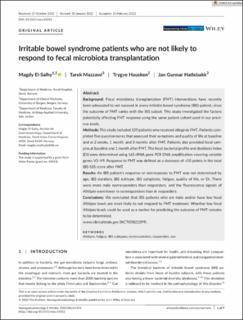| dc.contributor.author | El-Salhy, Magdy | |
| dc.contributor.author | Mazzawi, Tarek | |
| dc.contributor.author | Hausken, Trygve | |
| dc.contributor.author | Hatlebakk, Jan Gunnar | |
| dc.date.accessioned | 2022-08-05T11:07:00Z | |
| dc.date.available | 2022-08-05T11:07:00Z | |
| dc.date.created | 2022-04-01T09:46:36Z | |
| dc.date.issued | 2022 | |
| dc.identifier.issn | 1350-1925 | |
| dc.identifier.uri | https://hdl.handle.net/11250/3010354 | |
| dc.description.abstract | Background
Fecal microbiota transplantation (FMT) interventions have recently been advocated to not succeed in every irritable bowel syndrome (IBS) patient, since the outcome of FMT varies with the IBS subset. This study investigated the factors potentially affecting FMT response using the same patient cohort used in our previous study.
Methods
This study included 109 patients who received allogenic FMT. Patients completed five questionnaires that assessed their symptoms and quality of life at baseline and at 2 weeks, 1 month, and 3 months after FMT. Patients also provided fecal samples at baseline and 1 month after FMT. The fecal bacterial profile and dysbiosis index (DI) were determined using 16S rRNA gene PCR DNA amplification covering variable genes V3–V9. Response to FMT was defined as a decrease of ≥50 points in the total IBS-SSS score after FMT.
Results
An IBS patient's response or nonresponse to FMT was not determined by age, IBS duration, IBS subtype, IBS symptoms, fatigue, quality of life, or DI. There were more male nonresponders than responders, and the fluorescence signals of Alistipes were lower in nonresponders than in responders.
Conclusions
We concluded that IBS patients who are male and/or have low fecal Alistipes levels are most likely to not respond to FMT treatment. Whether low fecal Alistipes levels could be used as a marker for predicting the outcome of FMT remains to be determined. | en_US |
| dc.language.iso | eng | en_US |
| dc.publisher | Wiley | en_US |
| dc.rights | Navngivelse 4.0 Internasjonal | * |
| dc.rights.uri | http://creativecommons.org/licenses/by/4.0/deed.no | * |
| dc.title | Irritable bowel syndrome patients who are not likely to respond to fecal microbiota transplantation | en_US |
| dc.type | Journal article | en_US |
| dc.type | Peer reviewed | en_US |
| dc.description.version | publishedVersion | en_US |
| dc.rights.holder | Copyright 2022 The Author(s) | en_US |
| dc.source.articlenumber | e14353 | en_US |
| cristin.ispublished | true | |
| cristin.fulltext | original | |
| cristin.qualitycode | 2 | |
| dc.identifier.doi | 10.1111/nmo.14353 | |
| dc.identifier.cristin | 2014443 | |
| dc.source.journal | Neurogastroenterology and Motility | en_US |
| dc.identifier.citation | Neurogastroenterology and Motility. 2022. | en_US |

